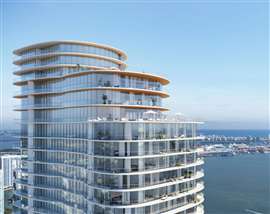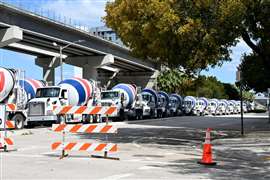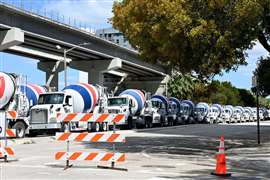Perpetual pour: 16-hour foundation job for Miami high-rise
10 November 2024
At the end of October, construction crews worked a 16-hour pour in Florida, US, for the Cipriani Residence Miami building.
 Render of the Capriani Residences Miami building in Florida, US. (Image courtesy Capriani Residences Miami)
Render of the Capriani Residences Miami building in Florida, US. (Image courtesy Capriani Residences Miami)
Developed by Mast Capital, the future high rise will hold 397 residential units within 80 storeys in the Brickell financial centre of Miami.
Construction Briefing spoke with general contractor Moss & Associates’ Kirk Noble, an executive for the firm’s construction division, all about the feat.
“The mat foundation for the tower is essentially 8,500 cu yd (6,499m3),” explained Noble, who added a 7,000-PSI concrete was used with some modifications. “They modified the cement and slag ratios and added retarder to help control the temperature of the concrete.”
Noble added the pour ran continuously for 16 hours as the project (including prep and clean up) lasted more than 20 hours.
Luis Hidalgo, senior vice president of Moss & Associates, said, “A concrete pour of this scale demands meticulous coordination across multiple teams, and it’s a testament to the dedication and collaboration of everyone involved,” said. “Managing the logistical complexity of over 50 team members and 750 truckloads of concrete over a 20-hour period highlights the expertise and commitment of our team.”
The scheme relied on more than 120 Cemex trucks, including drivers that Cemex bussed in specifically for this pour. In Miami’s dense downtown district, Noble said planning logistics was as intensive as the marathon pour.
“Planning well in advance,” said Noble, was key, including communication with public agencies like the public works, the police and the public. “Safety is our number-one concern always… shutting down the streets and ensuring the project safety with fencing.”
With the foundation set, the only place for the project to go now is up, with the tower expected to finish construction in 2028.
Cipriani Miami job used self-consolidating concrete
 A row of Cemex trucks in Miami. (Image: Okan Group)
A row of Cemex trucks in Miami. (Image: Okan Group)
Noble said one of the more unique aspects of the pour was the use of self-consolidating concrete (SCC). SCC is a concrete mixture that flows and solidifies on its own weight. It’s used for its high fluidity on projects that require concrete to fill dynamic spaces and shapes without splitting or separating.
“It’s essentially like self-levelling concrete that they could pour that would make its way through the rebar in the bottom mat,” said Noble, noting that SCC was used for about the first 3-4 ft of the pour where there was a high amount of reinforcing steel. “I believe there were 13 layers of #11 [rebar].
“A standard concrete mix would not make its way through that, and we wouldn’t be able to confirm, in any way, that there wasn’t a void,” continued Noble, who said the high-strength concrete was then layered onto of the SCC.
Vertical reinforcement was thus in important aspect for the project to manage.
“The ground floor shear wall in the basement has a steel plate, which is a 3-in thick steel plate,” explained Noble. “It’s two plates sandwiched together and that plate has metal studs that are 6 inches on centre, each way. So, it’s basically a big sheet with metal studs coming off of it on both sides.
“Coordinating with the #11 rebar, the vertical dowels had to be modelled in BIM 3D modelling; all the vertical rebar with the steel plate and ensuring exact placement in the field so when that steel plate arrived it would be able to slide right down in place without any issue. And that is a massive plate; the entire length of the shear wall for the elevator.”
STAY CONNECTED



Receive the information you need when you need it through our world-leading magazines, newsletters and daily briefings.
CONNECT WITH THE TEAM








